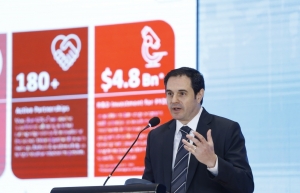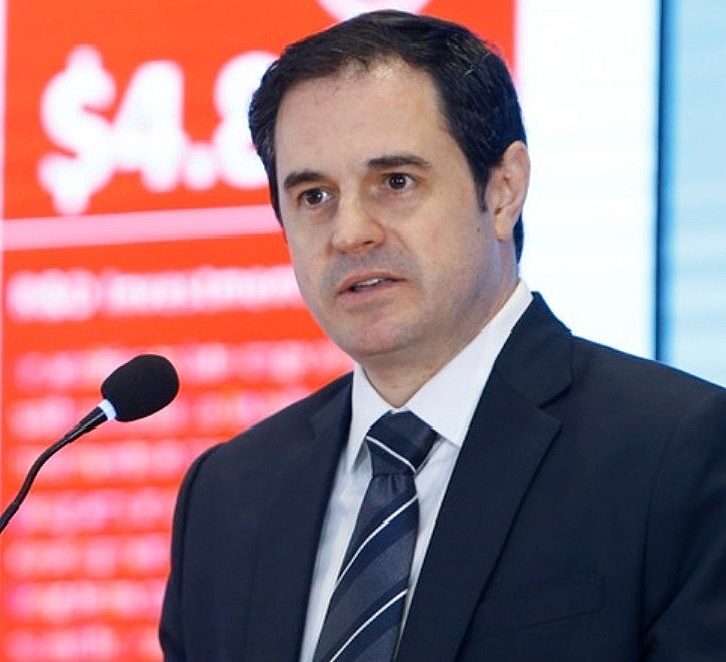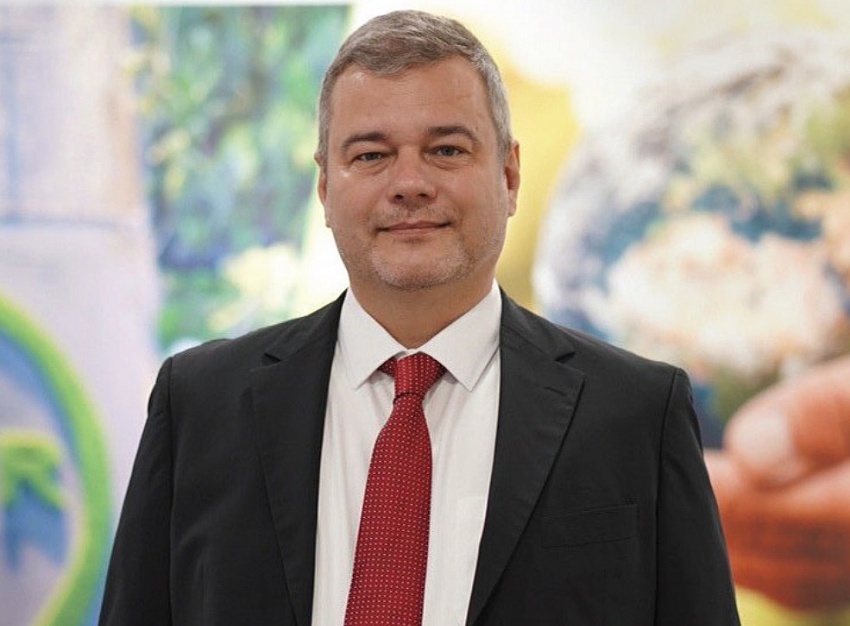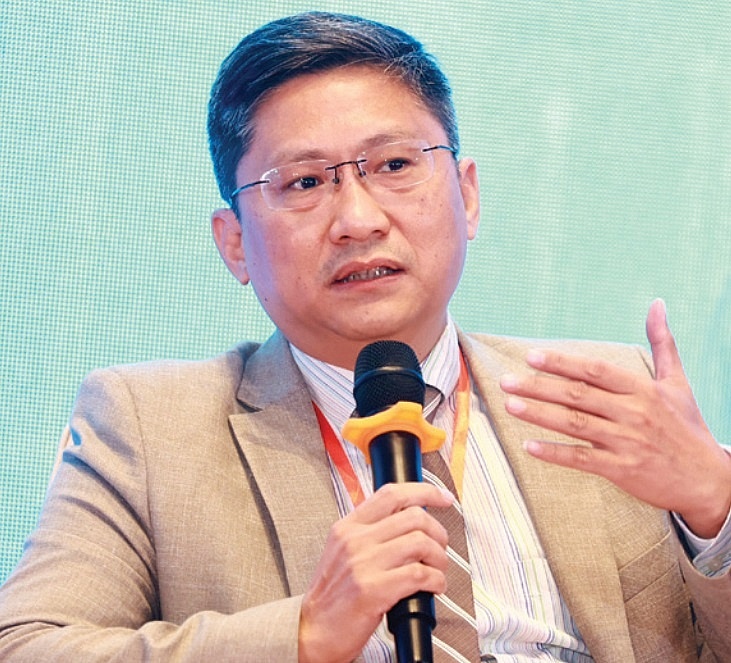Competitiveness to emerge through innovative solutions
 |
| Last week’s conference heard examples of Vietnamese businesses making strides in the healthcare sector |
Pharma group Takeda is committed to advancing a healthier future in Vietnam by expanding access to medicine and strengthening partnerships for public health.
Speaking at VIR’s conference on empowering innovation for healthcare last week, Dion Warren, area head of Takeda India and Southeast Asia, said, “We strongly believe in the value of public-private partnerships to jointly build a more sustainable healthcare system in Vietnam and enhance patient access to safe and effective prevention and treatment methods. This is a key strategy for Takeda, and we have achieved important milestones after a decade in Vietnam, spanning oncology, rare diseases, plasma, and now vaccines.”
In May, Takeda reached a new milestone when the Ministry of Health (MoH) approved its dengue vaccine, making it the first such vaccine in the country. This offers a new prevention method as part of Vietnam’s integrated strategy to combat the growing public health threat of dengue.
Meanwhile, AstraZeneca has been supporting the development of innovative tech and interventions to tackle the burden of non-communicable diseases in Vietnam.
Atul Tandon, general director of AstraZeneca Vietnam, said, “We believe collaboration is key to driving meaningful healthcare innovation. To strengthen partnerships with local stakeholders, we have implemented several strategic approaches, including public-private partnerships, academic collaborations, industry alliances, and also community engagement. Through these approaches, we aim to create a collaborative ecosystem where stakeholders work together to address healthcare challenges and improve patient outcomes.”
Vietnam’s national strategy for the pharmaceutical industry targets developing the sector to Level 4, the highest classification by the World Health Organization, by 2045. This will be driven by pharmaceutical innovation amid the digital transformation stage.
Effective innovation
Seck Yee Chung, partner at Baker McKenzie Vietnam, said promoting innovation is crucial for strengthening the competitiveness of pharmaceutical players in the international integration landscape.
“One significant element for this development is a robust legal framework. Acknowledging this, the government is developing new regulations, including the draft laws on data, digital technology, and personal data protection. These aim to cover the application of advanced technology and ensure data protection across sectors, including healthcare,” Chung said.
The proposal to allow over-the-counter drug sales via e-commerce platforms and applications, part of the draft amended Pharmaceutical Law, has received support from the community, simplifying the drug purchase process. The MoH is also collaborating with other units to complete the draft, which is slated for presentation to the next National Assembly session in October.
“However, more efforts are needed to create a favourable environment for Vietnamese pharmaceutical enterprises to innovate effectively, building a promising outlook,” he added.
In biotechnology, Vietnamese firms are making significant strides in the healthcare sector, focusing on emerging fields such as diagnostics, personalised therapies, and the production of biologicals for disease prevention and treatment.
Gene Solutions, a local genetic testing company, is expanding the capabilities of its AI-driven tumour-specific methylation atlas. The ongoing research and development (R&D) aims to provide high-quality analysis and reduce the cost of assays, making cutting-edge cancer screening tools more accessible worldwide.
Biotech firms are also applying interdisciplinary techniques across molecular biology, microbiology, biochemistry, and nanotechnology to develop breakthrough solutions that are safe, effective, and minimise side effects.
Since its inception in 2010, Vietnamese biotech firm LiveSpo Pharma has heavily invested in R&D, focusing on innovative probiotics that are fast-acting and safe, offering solutions for digestive and respiratory health with fewer side effects. The company’s R&D spending is nearly 3 per cent of its total investment, with potential for further increases.
LiveSpo has outlined a long-term plan to boost R&D, incorporating new technologies and expanding international collaborations to capture global biotech trends.
Collaboration and investment
Nguyen Thi Van Anh, R&D director at LiveSpo, said Vietnam was witnessing a rise in government and private investment in biotechnology, particularly in healthcare, with national initiatives supporting collaborations between research institutions and biotech businesses.
“As a result, the country is fostering an environment for healthcare innovation that can be commercialised and scaled through supportive policies, collaborative efforts, and investment from both domestic and international sources,” Anh said. “Private companies are also increasingly investing in R&D to create new products and improve existing ones, providing better conditions for launching new initiatives, driving technological innovation, and enhancing competition with international companies.”
Vietnam’s healthtech sector saw significant growth during the coronavirus pandemic, spurred by the rising demand for digital healthcare services. Post-pandemic, healthtech startups continue to innovate by addressing gaps in accessibility, affordability, and scalability. Many startups are also leveraging AI, telemedicine, electronic health records, and data analytics in order to improve patient outcomes.
Online pharma platforms like Buymed have streamlined drug distribution, improving access to medication in rural and underserved areas. The growing middle class, with rising healthcare expectations, has been a key driver of this growth.
Hoang Nguyen, Buymed’s co-founder and CEO, said that funding for Vietnamese healthtech startups had steadily grown, supported by regional and global investors.
“In recent years, we’ve seen a surge in venture capital and private equity investment targeting healthtech companies with scalable solutions. Healthtech’s potential to address inefficiencies in Vietnam’s healthcare system makes it an attractive investment,” he said.
For Buymed, securing new funding will likely focus on scaling operations, enhancing technology infrastructure, and expanding services regionally. Strategic partnerships with healthcare providers, insurance companies, and government bodies are also being explored to drive further healthcare innovation.
Market research firm Statista predicts revenue in the digital health market will grow at an annual rate of 9.75 per cent from 2024-2029, with a projected market volume of $1.47 billion by 2029.
| Vu Van Chung, deputy general director Foreign Investment Agency Ministry of Planning and Investment
Vietnam has attracted 40,000 foreign-led projects so far, with registered investment capital of $491 billion. There are 159 foreign-invested projects with a registered investment capital totalling $1.8 billion in the healthcare and pharmaceutical sector. Compared to the foreign investment in Vietnam, this is a modest figure. The majority of foreign investors come from Singapore and Taiwan, while those from leading economic and medical centres such as the US and Europe are few. Vietnamese enterprises face several challenges when cooperating with foreign enterprises. Most of them are state-owned enterprises and cooperation is not tight, due to the gaps in capital, capacity, and technologies. Recently, the trend of investing in projects, complexes, and industrial parks in health and pharmaceuticals has been formed. With the formation of these zones, the conditions and resources within the legal framework will be reviewed to create a breakthrough in attracting investment next time. The Ministry of Planning and Investment will continue to closely coordinate with the Ministry of Health and relevant agencies to continue perfecting regulations to create better conditions for investors. Dion Warren, head, Multi-Country Organization India and Southeast Asia Takeda Pharmaceuticals
Takeda is committed to innovation and a healthier future in Vietnam, with a focus on expanding access to medicine and strengthening partnerships for public health. We strongly believe in the value of public-private partnerships to jointly build a more sustainable healthcare system and enhance patient access to safe and effective prevention and treatment methods. With that being the important strategy in everything we do, Takeda has achieved important accomplishments after a decade of presence in Vietnam, spanning all disease areas: oncology, GI, rare diseases, plasma – and now vaccines. We also actively support programmes that address the unmet needs of patients with rare diseases, including plasma-derived therapies and innovative treatments for multiple myeloma and Hodgkin’s lymphoma, to name a few. In May 2024, we marked another milestone as the Vietnamese Ministry of Health (MoH) approved Takeda’s dengue vaccine, making it the first dengue vaccine approved in the country, adding a new and innovative prevention method as part of an integrated prevention strategy in Vietnam to combat the rising public health threat of dengue in the country. The approval of MoH and the availability of the dengue vaccine in Vietnam marks an important milestone toward sustainable and proactive dengue prevention, adding an important paradigm to existing integrated prevention measures. Expanding vaccination coverage is critical to our strategy against infectious diseases – and to achieve this, Takeda believes strengthening partnerships with local health authorities, academic institutions, research centres, and both public and private vaccination centres and partners is crucial. Our goals include raising awareness and education about dengue and the importance of vaccination, advocating for sustainable dengue management policies and integrated strategies, and providing comprehensive training for healthcare professionals in vaccination practices. Ingo Brandenburg, managing director, Bayer Vietnam
Innovation in the pharmaceutical sector transcends mere product development – it necessitates the cultivation of a collaborative ecosystem. Establishing robust connections among partners and fostering collaboration are integral components of this transformative process. Central to this dynamic is the pivotal role played by governments in nurturing a conducive framework for such initiatives. At Bayer, we recognise the value of teaming up with others who share our goals. This includes other companies, universities, and groups in both the private and public sectors. By working together in strategic alliances, we combine our expertise and pool our resources. These collaborations not only help advance healthcare but ensure patients are at the centre of everything we do. Through our partnerships, we pioneer new ways of providing more personalised care that is focused on patients’ needs and enhancing better access to quality treatment and healthcare services. By synergising our efforts, we drive medical progress farther than any one organisation could alone. Our vision of “health for all, hunger for none” is only achievable via collaborative innovation that places communities at the heart of solutions. Ta Manh Hung, deputy director general Drug Administration of Vietnam
The Law on Pharmacy has propelled progress for the pharmaceutical industry. Previously, pharma companies were mainly state-owned enterprises. Today, there are over 200 factories operated by private companies. The industry provides enough medicine for the basic medical needs of the people, but after eight years since the law’s implementation, some aspects need to be revised. Some key focus areas include reforming administrative procedures, increasing access to effective medicines for the people, and innovative investment incentives that focus on new drugs and drugs from medicinal herbs. Policies on drug supply on e-commerce platforms should also be considered. The pharmaceutical industry is special, directly related to the health and lives of people, so caution is needed. In other industries, it is possible to cut down on administrative procedures and conduct post-audits, but in the pharmaceutical industry, this is not possible. Drug licensing must fully comply with the procedures. Luke Treloar, partner and head of Infrastructure, Government, and Healthcare KPMG Vietnam
One of the most prominent trends impacting Vietnam today is the significance of time, particularly in terms of entering new markets. The timeline to access these markets has become compressed, meaning there’s limited time for action. However, this creates an opportunity for Vietnam to rapidly learn from these markets, develop quickly, and make significant leaps forward. The country has the potential to evolve from being an import-dependent market to becoming a manufacturing hub that supplies products both domestically and for export. By leveraging global technologies and applying them within the country, we can conduct clinical trials, carry out research and development, and eventually export our innovations. The ultimate goal is to access new markets and capitalise on compressed timelines that allow faster growth. Vietnam can learn from other markets and fast-track its development process to make a leap comparable to global leaders. This will depend on key decisions. An important factor is how intellectual property is protected, and how a friendly environment for foreign investment will be fostered, allowing Vietnam to reap the benefits. Many Southeast Asian countries have expressed a desire to engage more investment in intellectual property and harvest the returns. Vietnam must make crucial policy decisions that will shape its future. There is great potential to engage foreign investment, and with a roadmap in place, Vietnam could see contributions amounting to $50 billion to its economy over the next 15 years. The first steps have already been taken, with a clear roadmap laid out for what we want to achieve in the pharmaceutical sector. We need to pinpoint where we would like to excel, and identify key priorities focusing on contributions to Southeast Asia and beyond. This journey offers significant opportunities for domestic and international businesses to elevate Vietnam’s standing in the region, positioning the country as a leading hub. But for this vision to become a reality, we must prioritise resources, expertise, and global talent to drive Vietnam towards becoming a true regional centre. Le Minh Sang, senior health specialist World Bank Vietnam Office
One of the strongest trends we are witnessing today is the application of new technologies, especially breakthroughs like AI and machine learning. The biggest impact of this wave of innovation is that it empowers patients and customers. In the past, we focused on digitising certain internal operations within organisations, including healthcare. However, the narrative has now shifted. Patients and customers have far more power than ever before. Businesses, especially in the healthcare sector, must adapt to the demands of patients who seek care anytime and anywhere, no longer limited by working hours or the confines of a service provider. Therefore, the current trend of digital transformation in healthcare is not just about technological advancement, but about empowering users. To succeed in innovation, we need to address two main environments: developing IT, and its application in healthcare. The IT environment must be vigorously promoted to support technological innovation. At the same time, the healthcare sector must adjust to efficiently adopt and apply new technologies. Vietnam must learn from neighbouring countries like Indonesia, where strong policies to support innovation have been put in place following the pandemic. If we do not quickly create mechanisms for healthcare technology assessment and sandbox policies, we risk falling behind regionally. If we wish to drive innovation in healthcare, we must swiftly implement such policies and establish healthcare technology assessment frameworks for sustainable development and international collaboration. |
 | Legal reform could woo foreign investment to pharmaceuticals At VIR's conference on sustainable healthcare on September 25, industry experts delved into the best methods to attract foreign investment to the pharmaceutical sector and how legal reform can create a breakthrough. |
 | Viatris delivering high-quality, accessible, and sustainable healthcare solutions Radhika Bhalla, head of Vietnam and Asia Alliance Markets at Viatris, said the company was committed to addressing healthcare needs more holistically, at the VIR Health Conference 2024 on September 25. Here is her speech. |
 | Innovation and biotechnology lead Vietnam’s healthcare development Unlocking the power of health innovation and biotechnology will help Vietnam keep pace with global trends in healthcare research and development, providing a golden opportunity for healthcare and pharmaceutical startups to rise and thrive. |
 | Takeda delivering transformative healthcare solutions At the VIR health conference- "Empowering health innovation for sustainability vision" held on September 25, 2024, Dion Warren – area head of India and Southeast Asia (I-SEA) of Takeda, emphasised Takeda's commitment in delivering transformative healthcare solutions for lasting social value. |
 | Attracting investment and international cooperation to unlock Vietnam's healthcare potential To achieve sustainable development in the healthcare and pharmaceutical sectors, Vietnam must adopt the strategy of 'go far, go together' through international cooperation and attracting foreign investment. |
What the stars mean:
★ Poor ★ ★ Promising ★★★ Good ★★★★ Very good ★★★★★ Exceptional
Related Contents
Latest News
More News
- Masan Consumer names new deputy CEO to drive foods and beverages growth (February 23, 2026 | 20:52)
- Myriad risks ahead, but ones Vietnam can confront (February 20, 2026 | 15:02)
- Vietnam making the leap into AI and semiconductors (February 20, 2026 | 09:37)
- Funding must be activated for semiconductor success (February 20, 2026 | 09:20)
- Resilience as new benchmark for smarter infrastructure (February 19, 2026 | 20:35)
- A golden time to shine within ASEAN (February 19, 2026 | 20:22)
- Vietnam’s pivotal year for advancing sustainability (February 19, 2026 | 08:44)
- Strengthening the core role of industry and trade (February 19, 2026 | 08:35)
- Future orientations for healthcare improvements (February 19, 2026 | 08:29)
- Infrastructure orientations suitable for a new chapter (February 19, 2026 | 08:15)







 Tag:
Tag:


















 Mobile Version
Mobile Version